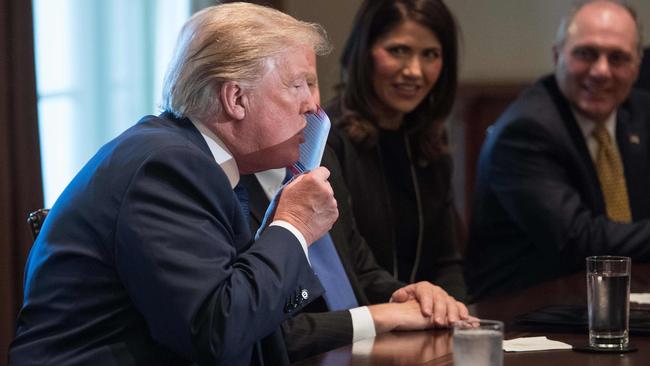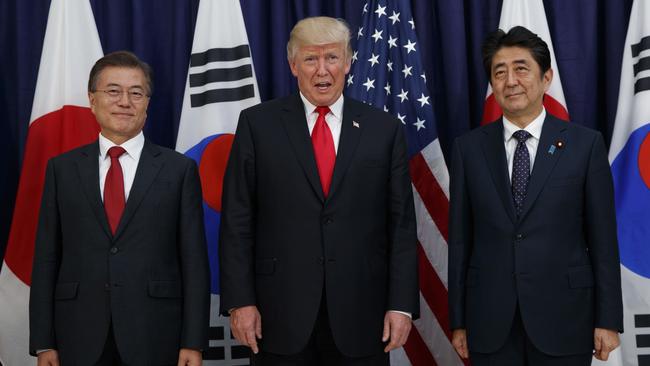First Asian tour to test a Twitterless Donald Trump
When Donald Trump arrives in Beijing he will be arriving in a country where Twitter is banned.

When US President Donald Trump flies from Seoul to Beijing next Wednesday, he will be arriving in a country where Twitter — like Facebook, YouTube and Google — is banned.
This would appear to be a rather bigger obstacle for a travelling Trump than telling his bodyguards they must leave their guns at home.
But undoubtedly a technological work-around has long been arranged for the world’s most famous tweeter.
Far less easy to fix are the three great challenges Trump will confront on this nine-day visit to Asia: denuclearising ever-cocky North Korea, rebuilding economic relationships in a way that neither alienates allies nor betrays his anti-trade voters, and seizing back for the US the central ground as the dominant power in Asia.
Success in any one would exceed most expectations from the visit — which are low, to a degree that should provide Mr Trump with some encouragement.
His hosts in Japan, South Korea, then China — Shinzo Abe, Moon Jae-in and Xi Jinping — are leaders lately greatly legitimised through their political systems.
They will need to feel, in discussions with Trump, that their voices are heard, and carry weight. This will be especially so on North Korea, where they are agreed on countering Kim Jong-un’s brazen aggression, but not at the price of a war that would cost all three immensely in lost lives.
The trade issues are severe.

One of Trump’s first acts as President was to withdraw from the 12-nation Trans Pacific Partnership that includes Australia. Abe especially had used up considerable political capital to get that far.
Instead, Japan has turned to the EU, with which it has already agreed an outline trade deal. Washington is seeking its own free-trade agreement with Tokyo, but Japan is pushing ahead with an 11-nation TPP.
As Australian trade group ITS Global says: “From almost every quarter, Abe is being advised not to agree to the Trump administration’s desire to begin formal bilateral trade negotiations”,
Trump says South Korea’s five-year-old trade deal with the US is “horrible” and is seeking to terminate it. Tentative talks towards amendments have begun, but again, a deal struck at the cost of such political capital in South Korea would be unwound at an even greater political price in terms of the American relationship.
China has, meanwhile, started to thaw its recently hostile relationship with South Korea despite the latter’s continued deployment of the American anti-missile system that provoked Beijing’s anger. Japan and China have also started to move closer, with Tokyo considering joining the Asian Infrastructure Investment Bank and pursuing Belt and Road Initiative opportunities, while Beijing has dialled down its critiques rooted in history.
Xi has sought to woo corporate America on the eve of the visit by meeting the chief executives of Apple, Microsoft and Facebook, as he seeks to push Chinese industry higher up the tech ladder, generally by preferencing local competitors such as Tencent and Alibaba.
Trump has previously attacked as unfair and unbalanced, trade and investment relations with China, and ordered in August a sweeping investigation. But US companies have typically been reluctant to participate in such inquiries, limiting the White House’s capacity to build a strong case.

Commerce Secretary Wilbur Ross visited the region in advance of the Trump trip, and predicted some “decent deliverables” with about 40 senior business leaders travelling with the President.
China remains focused on pushing Washington to classify it as a market economy, reducing the potential anti-dumping penalties under World Trade Organisation rules. Ross will not return next week, and neither Treasury Secretary Steven Mnuchin nor chief economic adviser Gary Cohn will be accompanying Trump, who will thus need to take the personal lead in trade talks during the visit. The recent Communist Party congress in China strengthened greatly Xi’s domestic authority, and his promotion of China as a great power in the “New Era” he heralds, with his BRI potentially delivering widespread infrastructure upgrades around Asia.
Although China’s neighbours mostly view its rise with caution, uncertainty about US economic policies and strategic direction is leading them to edge inevitably closer towards Beijing. For instance, while Southeast Asian claimants are unhappy about Beijing’s steady transformation of the South China Sea into a Chinese lake, they have shifted towards accepting it as a fait accompli, with the exceptions of Vietnam and to a lesser degree Indonesia.
Massive attention will be focused on how Trump — needing to summon all his business acumen and deal-making experience — handles such complex challenges within not only bilateral talks, but within the APEC and ASEAN settings with their established conventions, in Vietnam and The Philippines.
Trump will need to win over the ASEAN 10 swiftly, at their 50th anniversary gathering, since he will slip away after the banquet, leaving Xi to promote his own winning ways at the ensuing East Asia Summit.




To join the conversation, please log in. Don't have an account? Register
Join the conversation, you are commenting as Logout